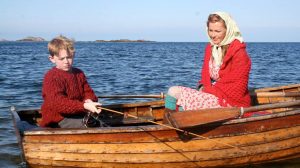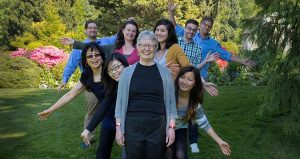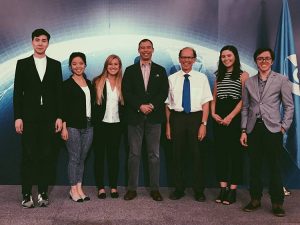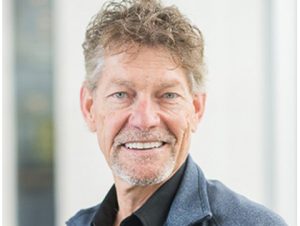Meet Alumni Mark McGuckin and Calum MacLeod: Creators of the television show, Road Hockey Rumble
How did two UBC film grads get their own television series after graduation? By doing what they love most: filming and playing road hockey. Mark McGuckin (BA ’04 Film Production) and Calum MacLeod (BA ’03 Film and TV Studies) — co-hosts, writers, and creative producers of “Road Hockey Rumble” — take their love of the game across Canada.
Three UBC Arts alumni collaborate on film – A Shine of Rainbows
It’s a small world after all: Editor Alison Grace (BA ’71 Film) ,Screenwriter Dennis Foon (MFA ’75 Creative Writing), and Associate Producer John Bolton (BA ’99 Hon. English) collaborated on the recently released and award winning film A Shine of Rainbows. A UBC Arts degree can connect you with talented peers for years after you graduate and take you around the world; in this case, a film set in Ireland.
Meet Robyn Laughlin: Using Psychology and Family Studies in her Ministry of Health co-op job
Through the Arts Co-op Program, Robyn Laughlin spent her summer in 2007 working as a research analyst for the Ministry of Health in Victoria. She says she was able to test all the skills she picked up during her three previous work placements.
Meet Dr. Duanduan Li: Teaching the Chinese language
When Professor Duanduan Li joined UBC from New York City’s Columbia University in 2003, she did so for a specific reason. She had worked as director of Columbia’s Chinese language program and was attracted to UBC because of its large community of heritage language (HL) learners — students with a background, though not necessarily a fluency, in the language being taught.
Meet Dr. Margery Fee: Fostering student engagement
Professor Margery Fee completed her PhD on Canadian literary history at a time when the topic was not as popular as it is today. “People just laughed and said, ‘You want to do a thesis on Canadian literature? Is there any?” Fee says of her years as a graduate student. Since then, Canadian literature has become a legitimate area of study, and Fee has remained committed to giving students “subject matter that they are interested in.”
Meet Professor Allen Sens: Tackling the world’s problems
“Fast education is a lot like fast food,” Professor Allen Sens of Political Science analogizes. “You get it quickly, it didn’t taste like much, but it’ll do for now.”
Professor Allen Sens has spent his professional life chewing over the kind of big-world problems his students want to fix.
“Anyone can criticize,” says Sens, adopting the same dramatic, bass tone that makes him a favourite in the classroom. “You just get a soapbox, go down to Stanley Park, stand up, and start screaming. It’s a lot harder to say what you’d actually do to effect positive change.”
Sens believes a pinhole lens is inadequate for big-picture issues like global warming, sustainability, genetically modified foods, and AIDS. That’s why he is troubled that most first-year students are directed like fish into one of two streams, Arts or Science, and spend the next four, or five years narrowing in on one specific focus, never to turn back. “We can’t have a society that’s going to be capable of solving these problems without having this understanding of both the scientific basis for the problems and the social and humanities perspectives of the problems as well.”
Fusing the physical life sciences dimensions of something like climate change together with political and social aspects is the inspiration behind the Terry Project, which Sens co-coordinates with David Ng, director of the Advanced Molecular Biology Laboratory in the Michael Smith Labs. Terry brings renowned public speakers like Stephen Lewis to UBC and also publishes creative writing, mainly from undergraduates, on terry.ubc.ca, the project’s website.
This year, Sens and Ng unveiled a cross-disciplinary course they’ve been shaping, called “Global Issues in the Arts and Sciences.” “Our intent is to get students thinking in an interdisciplinary way, across Arts and Science, very early in their careers,” Sens explains. The professor has earned wide appreciation for his efforts, winning the 2003 Killam Teaching prize from fellow-faculty, plus two Just Dessert Awards, given on behalf of students by the Alma Mater Society.
Besides teaching in the Department of Political Science and being chair of the International Relations Program, Sens is probably best known for teaching “Introduction to Global Politics,” a must-take course that fills up quickly every time it is offered. “Let’s face it, content changes all the time, especially in international relations,” says Sens, referring to his own experience as a student. His PhD thesis on the possibility of a global nuclear war triggered in Europe changed “over the course of virtually an evening,” when the Cold War ended.
With this in mind, he tries to provide students with tools for lifelong learning so they can tackle those issues that frequently change in shape and size. “One of the things that troubles me about what I’ve seen particularly in recent undergraduates is they’re all in a great big rush. It’s as if our society has already imprinted onto them this image of where they need to be at a certain point in their lives, and what you need to have in order to advance, or be successful,” Sens says. “It may be more of a path to ulcers and premature graying.”
He advocates the five-year degree, and encourages students to submit their ideas to undergraduate journals, and get involved in policy debates and student governance — in other words, to allow time for thought, reflection, and analysis before graduating.
According to Sens, unless we slow down and think beyond our own personal areas of interest, we will not be equipped to address the global issues we face.
“Fast education is a lot like fast food,” he analogizes. “You get it quickly, it didn’t taste like much, but it’ll do for now. I’m a promoter of slow food and slow education. Savor it, develop the flavours, try new things, experiment.”
By Josephine Anderson, an English major at UBC.
Meet Professor Tina Loo: Following suit to make a difference
In some ways, Professor Tina Loo wants to be the Al Gore of the history department.
“He’s a masterful teacher,” says Loo, who saw the former U.S. vice-president deliver his history-making slideshow in Calgary in 2007. “It’s not everybody who can speak for two-and-a-half hours about a bunch of really boring atmospheric science and make it seem interesting and be full of passion,” she adds.
Loo was impressed by how Gore handled a tough crowd: an auditorium filled with oil barons and top politicians in a province quickly becoming Canada’s biggest carbon producer.
Both Al Gore and his award-winning film An Inconvenient Truth (2006) figure in a first-year course on global warming that Loo, an environmental history expert, will teach this fall from the Dept. of History. Called “History 105: The Global Environment,” the course explores, among other things, why Gore received a standing ovation at the end of his Calgary presentation — a surprising finale for many. “Environmental issues are really shaping political engagement,” says Loo, who believes the current climate change debate is politicizing people beyond the existing categories of left and right.
By exploring that shift with students, Loo hopes to “get beyond the paralysis of that all of us seem to feel on the issue” of global warming.
That approach to a troubling topic echoes her work on other themes. As the Canada Research Chair in Environmental History, Loo studies how government policies and social discourses impacted the environment in 19 and 20th century Canada.
Loo specializes in uncovering how past rationales have led to modern environmental dilemmas. Her research has focused the era of mega-projects and hydroelectric dams in BC, as well as Canada’s history of wildlife management, both subjects on which she has authored numerous books and articles. In her work on state power projects, for example, she explored how governments banked on public optimism and confidence in the state in the 1950s through 1970s. The belief that damming rivers for electricity could result in a better society for everyone helped shape the provincial landscape we know today, she says.
“That was a very particular historical moment that to a certain extent has passed,” she explains, adding that she thinks people now are quite cynical of the ability of government and suspicious of the notion of experts. “Partly because expertise has got us into a lot of trouble,” she says. “Science has not necessarily resulted in the better world that people hoped for.”
Loo’s work with First Nations has tried to show how emotional and anecdotal experiences of environmental change are just as important as the official research carried out by government scientists.
If there’s one thing she’s gleaned from her work digging through archives — which she likens to “an Indiana Jones experience” — it’s that individuals and local groups can impact outcomes, including global warming.
“I think that history tells you that things aren’t inevitable, and they could have been different,” she says.
By Bryan Zandberg (BA ’06), former editor with The Ubyssey.
Alumni Stan Persky wins Lieutenant Governor’s Award for Literary Excellence
Born in Chicago, Persky immigrated to Vancouver in the 1966. UBC BA’69 (Anthropology) MA ’79 (Sociology), Persky has been a media commentator for CBC and literary columnist for the Vancouver Sun, the Globe and Mail, This Magazine, Saturday Night and The Tyee. Persky also regularly contributes articles and reviews to Dooneys Cafe and his personal website, splitting his time between Vancouver and Berlin.
Persky is a Philosophy instructor at Capilano University and author of 20 books, including Fantasy Government: Bill Vander Zalm and the Future of Social Credit, The Short Version, At The Lenin Shipyard: Poland and the Rise of the Solidarity Trade Union and Buddy’s: Meditations on Desire. He co-founded the Georgia Straight Writing Supplements which led to the establishment of the Vancouver publishing house New Star Books.
“We have chosen Stan Persky as the recipient of the 2010 Lieutenant Governor’s Award for Literary Excellence because of the intellectual and moral integrity he brings to his work as a writer who engages with some of the most difficult questions facing society, and because of the great contributions he has made to the literary canon of Canada and British Columbia.
His numerous books and his trail-blazing efforts in creating literary journals and a forum for public engagement – not least New Star Books and the Georgia Straight – have helped develop British Columbia’s literary community into what it is today. His grace as an essayist, his curiosity and independence of thought as a critic and newspaper columnist, and his exuberance as a civil rights activist and a leading voice of the gay community have enriched us all.
Stan Persky is our Socrates. British Columbians can rightly boast that he is truly one of ours. ”
-Terry Glavin, 2009 recipient of the Lieutenant Governor’s Award for Literary Excellence.
The $5,000 award is given annually to a B.C. writer who has contributed to the growth of literary excellence in the province. Persky was presented with the award by the Honourable Steven Point on April 24th. He commented in an email to Capilano University Newsroom that “I received the lieutenant-governor’s letter informing me of the reward April 1, so I immediately assumed it was an April Fool’s joke. Once I persuaded myself that it wasn’t a seasonal hoax or a quirky display of the L-G’s sense of humour, I immediately thought of the names of about 20 other writers in B.C. who are probably more deserving of receiving this honour than I am.”
Other UBC finalists for the BC Book Prizes include alumna (Sociology) and Assistant Professor Larissa Lai, whose book of poetry Automaton Biographies was short listed for the Dorothy Livesay award and alumna (Creative Writing) and Adjunct Instructor Annabel Lyon whose novel The Golden Mean was shortlisted for the Ethel Wilson Fiction Prize.
[Photo courtesy BC Book Prizes]
Meet Professor Ashok Kotwal: Exploring the Economics of development
Professor Ashok Kotwal’s career in economics has focused on the problems of absolute poverty and the inequality of incomes. His most current research has centred on the impacts of the recent economic reforms in India.
Professor Kotwal still remembers what induced him to become a development economist, even though that journey started three decades ago. Like many of his friends, Kotwal had recently emigrated from India to the United States working as an electrical engineer in the computer industry around Boston. Five years into his new life in Boston, however, he says he was still thinking of life back in Bombay. “There were people [in India] far smarter than I was, and just because I happened to be in the US, I had a much better standard of living and far fewer constraints on my freedom than they did.”
Kotwal’s Journey: Ethics and Economics
Casting about for what he could do about the disparity, Kotwal says his mind kept turning to his politically engaged family, and especially to his brother-in-law, who taught economics at a college, but spent most of the time working in the slums of Bombay. He decided to study economics to understand better what kept some countries poor. A doctoral degree from Boston University and nearly 30 years at UBC later, Kotwal has a distinguished career in development economics. Though applicable across borders and cultures, much of his research has focused on the problems of development within the Indian experience.
The West, he notes, is well aware that the world’s two most populous nations — China and India — are rising. However, fewer people know the story of the effect of the massive economic changes for the poor in these countries. “They’re both growing fast over the last 20 years, but what’s happening in China is much different than what’s happening in India,” Kotwal says. While absolute poverty has fallen dramatically in China, it has been much less so in India. Twenty-five per cent of the population, or approximately 250 million people — that is, about eight times the population of Canada — still live on less than one dollar a day, Kotwal explains.
Unearthing the causes of that dynamic — why wealth in India fails to trickle down — is the subject of his recent study conducted jointly with colleague Mukesh Eswaran and two scholars from India. Organizational structures and institutions, labour and credit markets, social capital, and the interaction between agriculture and industry are some of the topics he researched. His book Why Poverty Persists in India, published in 1994, and a significant part of his research in development economics was done jointly with Mukesh Eswaran.
Tied to his academic inquiries is a deep desire for his work to be applicable. In fact, some of the research questions he studies are generated from NGOs working in India. “They want something concrete, and not just academic abracadabra,” Kotwal says.
Teaching About Poverty
But when you’re dealing with a problem as pervasive as the causes of a sub-continent’s poverty, questions can be more forthcoming than answers, he admits. “Sometimes it’s frustrating to students,” Kotwal says. “They say, ‘If you don’t know, nobody knows. Then why should we study it?’”
Perplexing as poverty may be sometimes, the journey of economic development around the world means the work never gets dull. Neither do Kotwal’s first-hand stories. To teach, he draws from his frontline research in India to talk to students about economic development, international development and other world issues. He also teaches a second-year course called “Understanding Globalization.”
“I came into economics quite late,” he says.
“Basically I ended up doing research on the real questions that motivated me.”
By Bryan Zandberg (BA, 2006, in French and Spanish). Bryan is a former editor with The Ubyssey.
Meet Dr. Dietmar Neufeld: Exploring Religion
Professor Dietmar Neufeld believes that an effective teacher is someone who can perform the story. “In the beginning was the word, and the word was performance.” So goes one of Professor Dietmar Neufeld’s mantras, which is also a tool he uses for unearthing the origins of Christianity.




